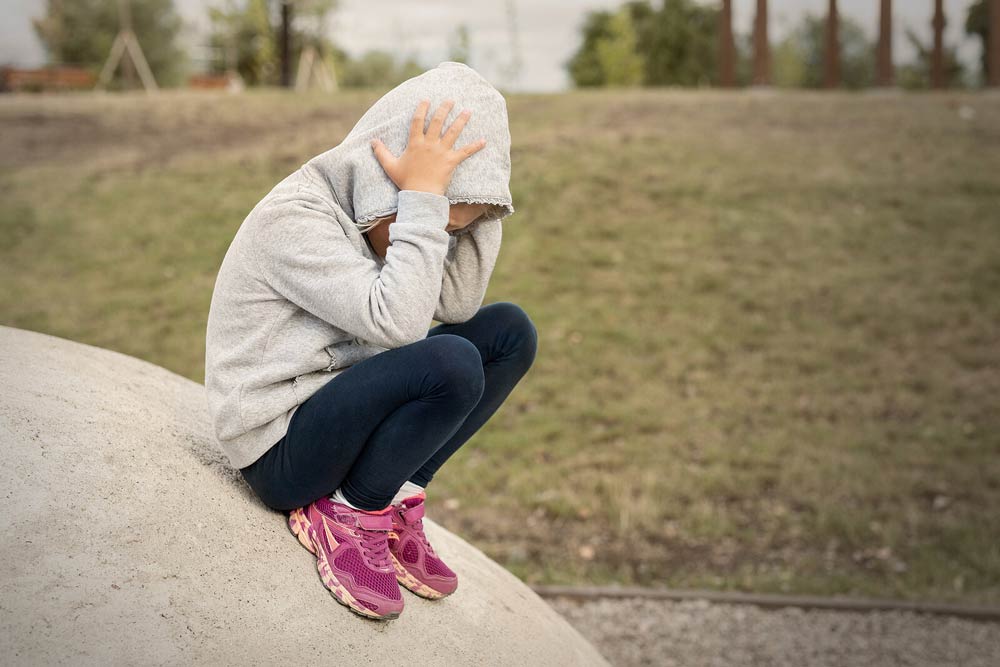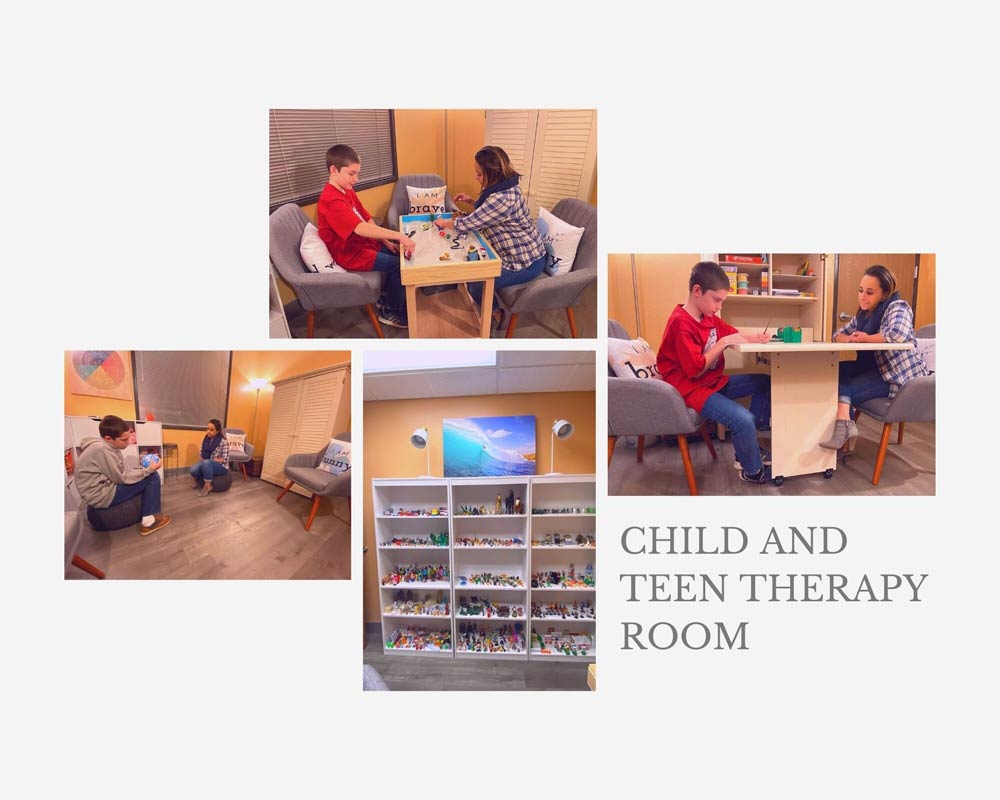Child Therapy: Helping Your Child Thrive Through Play and Counseling
Discover how child therapy and play therapy can help your child overcome emotional challenges, cope with trauma, and develop healthy coping skills. Learn about the process, benefits, and when to seek professional help.
Signs Your Child May Benefit from Therapy
You’ve realized that your child is struggling emotionally or academically in school.
You have noticed that your son or daughter isn’t acting like themselves. All of a sudden they’re angry, stressed, sad, or restless.
Your child has experienced trauma and you’re looking for support to help them cope with the emotions they’re experiencing.
Your family is going through a transition like a divorce, loss of a loved one, or a move.
As a parent, there’s nothing worse than watching your child struggle or feeling like you can’t help them. Often when children have experienced things that upset them, they can’t express what they’re thinking and experiencing. So, they act out or become withdrawn. It’s their way of coping.
Unlike adults, children can’t sit down and talk about what they’re thinking or feeling. That’s where child counseling and play therapy come in. Children’s natural language is play, it’s how they express themselves. There is so much progress that can be made during play therapy and that’s why it is the therapeutic approach of choice amongst mental health professionals.
What is play therapy?
Play therapy is a specialized form of psychotherapy used with children. It honors their developmental and emotional abilities by looking for ways to help them through their natural language of play. Play therapy is most effective for children between the ages of 3 and 12. Also, play therapy can help children of any gender or race. Another benefit is that it can also be used in conjunction with family therapy. So, our therapists can help both your child cope with their emotions and your family’s overall connectedness and functioning.

Benefits of Child Therapy
- Improved emotional regulation and coping skills
- Enhanced self-esteem and confidence
- Better communication and social skills
- Reduced anxiety and depression symptoms
- Improved academic performance
- Stronger family relationships
What mental health concerns can be treated with therapy for children and play therapy?
If you have a concern about your child’s mental health or behavior. Getting a professional’s opinion on what to do is recommended. However, common things that bring children to counseling include:
- Anxiety
- Extreme separation anxiety
- Depression or extreme and persistent sadness
- Trauma and/or PTSD
- Grief and loss
- ADHD
- Conduct concerns, aggression, and poor emotional regulation
- Nightmares and bedwetting
- School refusal
- Social anxiety or becoming socially withdrawn
- Life transitions such as divorce, parental separation, moving, etc.
- Autism spectrum disorders
- Eating disorders
- Obsessive-compulsive disorder (OCD)
The Importance of Specialized Child Therapists
The first step in successful child counseling is building trust. That’s why it’s very important your child has the opportunity to work with a child therapist. A therapist who specializes in working with children should be skilled at building a relationship with young children and creating a safe environment for them to express themselves. At the relationship therapy center, we have child therapists on our staff who are experienced play therapists. This means that they have gone through extensive training on how to best help children and preteens process their feelings and thoughts through play.
What to Expect in Child Therapy and Play Therapy Sessions?
Play therapy is very individualized to meet the needs of the children that come to counseling. As a therapist gets to know their client, they will learn their likes and dislikes. The children will be presented with a variety of activities, games, and toys to play with. These may include things like a sand tray, dolls, board games, puzzles, art supplies, and more. As children explore our playroom they will gradually act (or possibly) draw the things that are bothering them, giving their therapist insight into what happened and how they could help.
Often negative thoughts, feelings, memories, experiences, traumas, and/or beliefs about themselves, have fueled the concerning behaviors. Holding negative things inside takes a lot of energy from your child, energy which they could use to learn new skills.

Once your child has learned that they can safely experience and express what they have been holding tight within themselves they will find relief. Then, they will have the energy needed to learn the necessary skills to manage their emotions and behavior better.
Children will be supported as they play out their troubles. The counseling room, or playroom, is a safe place for them to explore these memories, feelings, and thoughts. Their therapist will also work with them to cope with the distress they are feeling. When the child is ready the therapist will use play to teach them healthy coping techniques to help them regulate their thoughts and emotions better in the future. Over time, it is our goal to help your child deal with their big feelings, reduce stress, and prevent undesirable behavioral outbursts or tantrums.
Sand Tray Therapy
Sand tray therapy is a tool used during play therapy. It is often used with children (and teens) that have experienced trauma. During counseling, your child’s therapist will offer them a sand tray and toy miniatures to create their own scene and act out the things that are on their mind. The belief is that they will act out the trauma or the situations that are bothering them and express things that they’re not able to otherwise say out loud.
Frequently Asked Questions About Child Therapy
How do you help a child who doesn’t want help?
Helping a reluctant child engage in therapy can be challenging, but there are several strategies parents can use. First, have an open and honest conversation with your child about their feelings and concerns. Explain therapy in a way they can understand, emphasizing that it’s a safe space to talk and play. You might also consider involving your child in the process of choosing a therapist, which can help them feel more in control. Remember, it’s normal for children to feel nervous about therapy at first. Be patient, supportive, and consistent in your approach.
Which therapy is most appropriate to deal with childhood problems?
While play therapy is highly effective for many children, the most appropriate therapy depends on your child’s specific needs, age, and the nature of their challenges. Play therapy is often the go-to choice for younger children, as it allows them to express themselves through their natural language of play. For older children or those with specific issues, other approaches like Cognitive Behavioral Therapy (CBT), family therapy, or art therapy might be more suitable. A skilled child therapist will assess your child’s needs and recommend the most appropriate therapeutic approach.
What are the causes of childhood anxiety?
Childhood anxiety can stem from various factors, including:
- Genetic predisposition
- Brain chemistry
- Environmental stressors (e.g., school pressures, family conflicts)
- Traumatic experiences
- Learned behaviors from anxious parents or caregivers
- Major life changes (e.g., moving, divorce)
- Medical conditions
It’s important to remember that anxiety in children is often a combination of these factors. A professional evaluation can help identify the specific causes and guide the most effective treatment approach.
What is CBT for children?
Cognitive Behavioral Therapy (CBT) for children is an evidence-based treatment that helps kids identify and change negative thought patterns and behaviors. In CBT, children learn to recognize the connection between their thoughts, feelings, and actions. The therapist works with the child to develop coping strategies, problem-solving skills, and more positive ways of thinking. CBT is often used to treat anxiety, depression, and other mood disorders in children. It’s typically more structured than play therapy and may involve homework assignments to practice new skills. For older children and teens, CBT can be particularly effective in providing practical tools to manage their emotions and behaviors.
Begin Play Therapy or Child Counseling in Roseville or Fair Oaks, CA today!
If your child is struggling one of the best things you can do is be proactive in getting your child help from a trained play therapist. With help and support you child can overcome the things that are troubling them and move forward in their life with more confidence and peace. Our counseling practice offers specialized play therapy and child counseling services by certified play therapists at both of our locations. Your child, and your family, can get to a better place. Our child therapists are here to help.
To begin counseling in Fair Oaks, CA, Roseville, CA or online, follow these steps
- Contact the Relationship Therapy Center and schedule a free 15-minute phone consultation to learn more about in-person or online child therapy.
- Make an appointment for your teen to meet with one of our compassionate child therapists.
- Get the support your teen needs to navigate adolescent challenges with confidence!


Other Services offered at The Relationship Therapy Center in California:
In addition to teen therapy, Our Sacramento area counseling clinics located in Roseville and Fair Oaks, CA are pleased to offer a variety of mental health services. Our couples services include: Counseling after infidelity, sex therapy, co-parent counseling, family therapy, divorce counseling, intensive couples retreats, and premarital counseling. Individual therapy services include, therapy for children, teen therapy, depression treatment, and individual relationship counseling. Our therapists offer online counseling in California to treat a variety of mental health concerns. Please reach out to our Sacramento area therapy office to learn more about the many ways we can help you or your loved ones heal and grow.
Reach out to start your healing journey today
